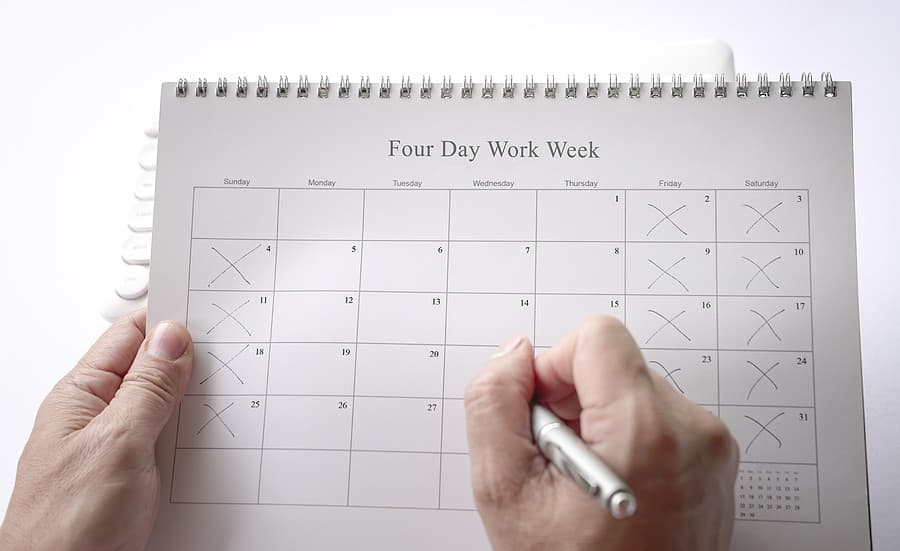As the media busies itself with story after story about who is returning to the office, who is still working from home, and who is leaving the workforce altogether, there is – I believe – a much bigger story brewing. In fact it’s so big it has the capacity to upend the way we think about work completely.
I’m talking about the four-day week.
Reality check first: Working just four days a week is an idea that surfaces every few years. It tends, however, to fade away again, or be misinterpreted as cramming all 40 hours a week into four days. This latter working model isn’t a four-day week; it’s simply compressed working. What I’m talking however, about is a permanent change to full-time work.
Why now?
Everything about the way we work is seemingly up for grabs right now. That’s why I believe the notion of a four-day workweek – where people work fewer hours on a regular basis – may just have more staying power this time.
The reason we are on the cusp of real change comes down to a fundamental truth about the way most of us work – a truth that, until now, we’ve been unwilling to admit: the fact that a lot of time spent at work was not productive time.
When we all started to work at home this truth was exposed. We soon began to realize we could get all of our truly necessary work done in much less time. This was because we weren’t wasting time on ‘busy work’ and unnecessary meetings. We also began to realize that if we had sufficient time off, we would also avoid feeling burned out and exhausted. In other words, we’ve all realized how better we can be spending our time.
The four-day week is already happening
Anyone skeptical that work normally done over five days can’t be accomplished in four only has to look at what the country of Iceland has been doing.
Between 2015-2019, the government there tried out four-day workweeks in dozens of workplaces, including preschools, offices, social service providers, and hospitals. The result was a resounding success: productivity stayed the same or improved, while workers reported they were less stressed, felt healthier, and had better work-life balance. Since then unions all over Iceland have been negotiating shorter weeks, with the result that 86% of the workforce either already has the right to work this way or soon will.
Similar experiments are underway in several other countries right now, and companies in the U.S. are beginning to take notice.
Last fall, tech company Bolt piloted a four-day work schedule. At the end of a three-month trial, 94% of workers and 91% of managers wanted the program to continue. Meanwhile, video game production company, Blackbird Interactive, recently went to a four-day schedule, and last summer Kickstarter announced that it would launch a pilot four-day program later this year.
While you may notice that many of the companies experimenting with this idea are on the small side, a few larger companies – including Panasonic – have also begun dipping a toe in the water. There’s even a global think tank of sorts now devoted to helping companies run pilots and assess the results of four-day working weeks. Initial results are very positive and studies have pointed to yet another advantage of a four-day workweek – the fact that it’s an excellent tool for recruitment and retention.
The concept of a shorter week has become so mainstream that even some in the government have begun taking notice: a bill reducing the standard workweek from 40 to 32 hours was introduced in Congress last summer.
Staff want shorter working weeks – the question is do you?
As you might imagine, most workers are fully on board for this change. One recent poll found 85% of Americans surveyed would happily take a four-day week over their current five days.
Another found a whopping 90% of Americans believe the five-day workweek is outmoded. Some 97% believe they’d be more productive on a four-day schedule, while 74% of those polled said they’d consider leaving their current job if they were offered a four-day position elsewhere.
Statistics like this should make HRDs sit up. The big question is, will you opt for the four-day week too?
Sure, there’s no guarantee the idea of a four-day week will stick any better this time than it has before. But given the shockwaves currently being experienced in the world of work, there’s no guarantee it will fade either. If ever there was a moment for a major shift in perspective, it’s now.
